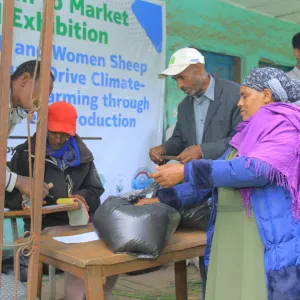Women and youth in sheep fattening find profitable business pathways through small-scale feed mechanization in Central Ethiopia
The youth and women sheep fattening groups baptized as Serara Cooperative organized an exhibition to showcase animal feed products, targeting local farmers and entrepreneurs in Doyogena, Ethiopia. The purpose of the event, held in June 2024, was to showcase their accomplishment, promote and market their animal feed products and services to the local community, and gather feedback from farmers on

Women and youth in sheep fattening find profitable business pathways through small-scale feed mechanization in Central Ethiopia
The youth and women sheep fattening groups baptized as Serara Cooperative organized an exhibition to showcase animal feed products, targeting local farmers and entrepreneurs in Doyogena, Ethiopia. The purpose of the event, held in June 2024, was to showcase their accomplishment, promote and market their animal feed products and services to the local community, and gather feedback from farmers on the use and satisfaction with the compound feeds and grinding services provided. The event highlighted various feed products designed for breeding and fattening rams and ewes. Attendees included local farmers, entrepreneurs, dairy cooperatives, and national researchers, who provided valuable feedback and insights for the cooperative’s future.
In his remark, the Livestock Research Director of the Central Ethiopia Agricultural Research Institute, Dr. Gemiyu Deribe noted that the ability to produce specialized feed formulations for specific species, including poultry or different production stages can command premium prices in the market. He reiterated “The profitability of the animal feed production line ultimately depends on several factors, including the scale of operation, raw material costs, energy efficiency, and market demand. There is a lot of work to be done!”
In 2022, three youth and women sheep fattening groups in Serara, Doyogena came together to form the cooperative, launching a pioneering ICARDA-led initiative to promote climate-smart livestock farming through sustainable feed production in Central Ethiopia. By utilizing locally available feed resources, they produce concentrate feed mixes and offer feed grinding services. Since October 2023, the cooperative has produced 600 tons of concentrate feed, benefiting over 4000 farmers and providing grinding services to 13,000 farmers. Initially, these services were exclusive to cooperative members but have now expanded to include the broader community.
The cooperative members have demonstrated strong commitment, sourcing and processing various agricultural and industrial by-products into quality feed. They face challenges such as maintaining stringent quality control, managing electricity outages, and meeting the high demand for ruminant feed. The cooperative is supported by partners like John Farm PVT and Electro Mecce, who assist with feed formulation and equipment maintenance.

Despite these challenges, the cooperative offers affordable feed, making it accessible to smallholder farmers. The cooperative aims to expand production capacity and enhance quality control measures. Halafa Handiso, the youth leader of Serara Cooperative remarked, ” the production unit is currently operating at 10% capacity; however, cooperative members are determined to increase production to also meet the demand for poultry feed”.
Moreover, Mulato Handaro, a cooperative youth member noted “Our rams are much healthier, and they are reaching market weights within three months or even less time. This is translating to higher market prices.” The processed feed is offered at an affordable price, making it accessible to smallholder farmers and ensuring that livestock farmers can sustain their fattening operations.
In response to the concerns raised by farmers highlighting problems of transporting purchased feed, Halafa Handiso assured the farmers “we are exploring options to improve access by considering the possibility of offering on-farm delivery services.
To ensure sustainability and scalability, the cooperative has identified several strategic steps, including establishing strong market linkages, facilitating loan processing, and developing infrastructure. The Serara Youth and Women Sheep Fattening Groups are setting an inspiring example of how local resources can be leveraged for climate-smart livestock farming, paving the way for sustainable and affordable feed production.
CGIAR Funding/Acknowledgement
Small-scale feed mechanization and sheep fattening is conducted as part of the Feed and Forage activities under Work Package 1 of the Sustainable Animal Productivity for Livelihoods, Nutrition, and Gender Inclusion (SAPLING) and Work Package 3 of mixed farming systems in Ethiopia
Featured image: Farmers purchasing feed during the Trade fair. Photo by S. Geribo/ICARDA
Authors: Jane Wamatu, Muluken Zeleke, Udo Rudiger and Gloriana Ndibalema.

